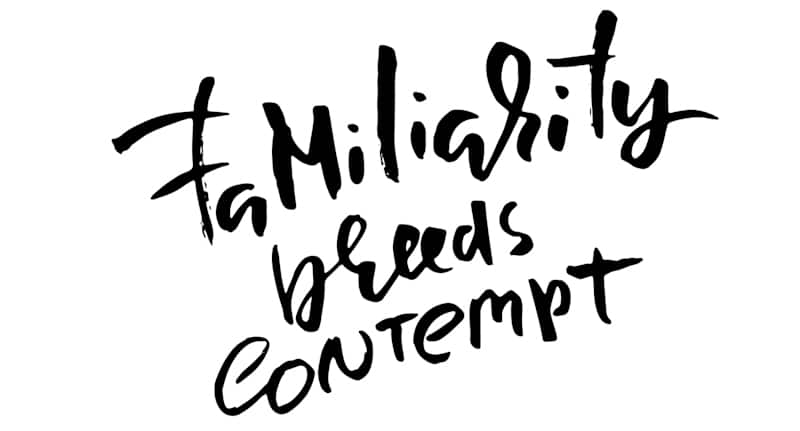Have you ever heard someone say, “familiarity breeds contempt?” If so, you may find yourself wondering exactly what they mean when they use this phrase.
The phrase “familiarity breeds contempt” means when you have a lot of knowledge about a subject you tend to lose respect for that subject. This could even be a person instead of a thing that you have a close association with.
Nevertheless, the fact remains that when you get too close to something or someone you lose respect for this subject.

Origin of the Phrase
In the late 1300s, we see the first written record of this phrase being used in the “Tale of Melibee” in the “Canterbury Tales” which was written by poet and author Geoffrey Chaucer. Interestingly enough this was also one of the longest tales he wrote. It also includes one of the other quotes that he’s famous for, “patience is a virtue.” Chaucer himself is thought of as the greatest English poet in the Middle Ages. Some have even gone so far as to call him the “father of English literature/poetry.”
While this is the first time we see this quote in written form, language historians believe that it may be much older than this. In fact, some think that it dates as far back as ancient times when the Roman writer Publilius Syrus used it. Then it was attributed to Pope Innocent III. This quote was also later used in the 1548 translation of Erasmus’ sayings. Some will even tell you that this is the first time the expression was written down in English but others would argue that Chaucer wrote it down first.
We once again see this expression being used later in 1928 author of “Phoenix II,” D. H. Lawrence used this expression in his writing.
Clearly, this is a saying that’s been used many times by many different people throughout the years so it should come as no surprise that it’s so familiar to us.
What a Proverb Is
“Familiarity builds contempt” is actually what’s known as a proverb. This means that it’s a short phrase that’s commonly used to impart advice or in order to share a universal truth. Some people may refer to it as an adage. Some of the other well-known provers which you may have heard of in the past include:
- Beauty is in the eye of the beholder.
- Absence makes the heart grow fonder.
- A picture is worth a thousand words.
- Blood is thicker than water.
Meaning of the Phrase
When you hear the phrase “familiarity breeds contempt” you may picture yourself in a court of law. This is because the phrase sounds so authoritative and judicial. However, you may be surprised to learn that this really isn’t what the phrase means at all.
Understanding this expression’s meaning basically comes down to understanding what each of the words in the expression means.
The first word, familiarity, refers to being close to someone or someone in some type of relationship.
The second word, contempt, means to despise something or someone. In other words, you’re looking down on someone or something with aversion.
Now when you take this whole phrase together you’ll understand that the closer one person gets to another person or a thing the more likely that person is to despise it.
Depending on who is using this phrase, it’s quite possible that it may have a variety of meanings. However, it’s relatively easy to understand what the primary meaning of this phrase is. In general terms, it means that the more one person knows about another the more they’ll come to dislike the other person. This is because the longer a person knows the other person the more they’ll get to see that person’s flaws. Unfortunately, when this happens, it could result in resentment. Even if you don’t find yourself resenting this person or thing you may find yourself losing respect for it the more you discover all of its qualities.
Sometimes this phrase is also used in referring to objects. For instance, you can use this phrase to mean that someone will get bored if they continue doing the same things over and over again. When this happens it’s important to try doing something new.
Some of the other things you can say instead of using this phrase include:
- The longer you’re involved in a situation, the more disdain grows
- The more you get to know someone and their habits, resentment can set in
- The more you get to know someone, the more likely you are to find fault with them

How the Phrase is Used
Oftentimes people will use this phrase when they’re referring to a relationship. While this is most commonly used in reference to a romantic relationship, the same proverb could also be used when discussing a close friendship though.
This same phrase can also be used in reference to an object as long as a person has been with it for a long period of time. For instance, someone may have had the same job or practiced the same hobby for quite a while. When this phrase is used in this way, it’s meant to say that the person hasn’t only grown bored with the object but they’ve also come to a point in which they actually hate the object.
Examples of How to Use the Phrase
Now that you know what the phrase means, you may find that you want to use it sometimes. With this in mind, here are some examples of how you can do so:
- I loved my job when I first started working here. However, the longer I’ve been here the more this has changed. As the old saying goes, familiarity breeds contempt.
- Initially, I adored everything about my wife – even some of her weird quirks. Now that we’ve been together for 10 years this has changed. I guess it’s true when they say familiarity breeds contempt.
- When we were kids I didn’t realize that my best friend was rude and mean. Now that we’ve grown older and I’ve known her for a while I’ve really started to take notice of this, unfortunately. I guess that’s because familiarity breeds contempt.
- When the pandemic hit my boyfriend and I decided to move in together. Now that we’ve been together at both work and home I’ve really come to understand the saying familiarity breeds contempt.
- As we live through the pandemic it’s become much easier for many people to see that familiarity breeds contempt.
- More than 400,000 people from overseas either watched or attended the tournament. As many have started to take notice that professional rugby is typically played in the same old venues. It’s no wonder they’ve started to believe that familiarity breeds contempt.
- The fact that there are many people who suffer from food insecurity has been referenced so often that people are in danger of becoming complacent about it. In this way, familiarity breeds contempt.
- Fortunately, most human beings are very adaptable. Unfortunately, this means that eventually, familiarity breeds contempt.
- When you get into a pattern whereby you find yourself doing the same thing day in and day out it’s easy to see that familiarity breeds contempt.
- Familiarity breeds contempt. Sickness and caregiving sap patience. This trio should really be sick of being around one another.

Check Out These Other Idioms
- Living Hand To Mouth
- It Is A Poor Workman Who Blames His Tools
- Out Of The Frying Pan And Into The Fire
- Clouds On The Horizon
Truth Behind the Phrase
Being familiar with this phrase may leave you wondering if this is actually true, especially since a proverb is used to express universal truths. Well, psychologists say that familiarity doesn’t always breed contempt. This is something that can be seen in romantic relationships where couples have been together a long time and are still able to find happiness and harmony. Instead, familiarity can bring couples closer together and breed a stronger intimacy and love between them.
Psychologists say that familiarity isn’t the problem. The real problem lies in what the person is becoming familiar with or accustomed to. For instance, when there are some negative patterns that emerge within a relationship it is quite possible that familiarity does breed contempt here. However, if your relationship has been built on things like positive communication and loving gestures that you’ve become accustomed to over a long period of time, then more than likely familiarity isn’t going to breed contempt here. This is because it’s hard for one partner to despise another partner in this type of relationship. So when you’re specifically talking about a relationship you may find that the expression may ring true but it doesn’t have to be this way. This is also true of a thing like a job or a hobby. While you may start to dislike it or feel bored with it sometimes these things may cause another person to love it more.
Shawn Manaher is the founder and CEO of The Content Authority. He’s one part content manager, one part writing ninja organizer, and two parts leader of top content creators. You don’t even want to know what he calls pancakes.

